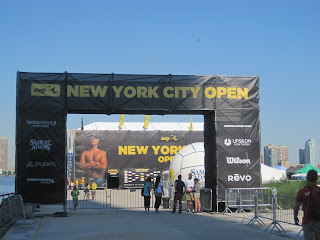First, a breakdown of Rick Suhr's comments, which really just come off as whining. "We have to be in the top three that day, that day only, or we don't go," he said. "We're stuck with it and we'll make the most of it...but I'm an advocate for change."
He also doesn't like the five-week gap between Trials and the Olympics: "In our American system, you have to peak twice, a month before the Games and again at the Games. That's very difficult. We lobbied for the two to be farther apart. Well, for some reason, the governing body decided to move the dates even closer, which doesn't make any sense. Basically if you pop a gasket in the Trials, you're done."
Suhr is wrong on both counts, but I'll deal with his second point first. One month in between actually sets everyone up for optimal performance at the Olympics. You don't need to peak twice. You need to peak once and hold it for about five weeks. And some of the best (Jenn Suhr included) are good enough to make the team without peaking at Trials, so I really don't get his argument there.
Besides, we saw last year how detrimental too long of a gap can be. U.S. Nationals (the Olympic Trials serve as U.S. Nationals in Olympic years) are always right around the same time at the end of June/beginning of July. Last year's World Championships weren't until the end of August. And Team USA was awful in Beijing, with many people blaming the nine-week gap between Nationals and Worlds as one of the reasons why.
Besides, we saw last year how detrimental too long of a gap can be. U.S. Nationals (the Olympic Trials serve as U.S. Nationals in Olympic years) are always right around the same time at the end of June/beginning of July. Last year's World Championships weren't until the end of August. And Team USA was awful in Beijing, with many people blaming the nine-week gap between Nationals and Worlds as one of the reasons why.
There's another practical reason why the Olympic Trials are so close to the start of the Olympics. They're at the absolute end of the qualifying period. In addition to finishing in the top three at Trials, you need to have the Olympic qualifying standard to compete in Rio. For World Championships, USA Track & Field will let you "chase" the standard if you don't already have it. For the Olympics, they don't do that. You must have the standard before Trials or get it at Trials in order to go. No "chasing." Why? Because, USA Track & Field and the USOC announce the Olympic team as soon as Trials end. It's only fair. You know at the end of your event at Trials whether you're an Olympian or not. If you finish fourth and have the standard, you don't have to sit there for a month and wait to see whether the third-place finisher gets the standard or not. Everyone knows the Olympic team right away.
Achieving the Olympic qualifying standard generally isn't a problem for the Americans. Which is precisely why you can't base it off the performance lists. For example, the women's 100 meter hurdles. This is going to be one of the most hotly-contested events at Trials. The final at Trials could be better than the final in Rio, and there are potential Olympic medalists that will be watching the Games from home.
Why is that? Because 11 of the top 15 women in the world this year are American! Now, you try telling Sharika Nelvis, who has the fourth-best time in the world, that since the three people above her on the world list are also American, she has no chance of going to Rio. Same thing in the men's 100 meters, where five men are under 10 seconds, but only three can go.
Each country has their own method for building their Olympic team. Many either go strictly off performance lists or use some combination of performance lists and a selection meet. That seems to be the method Rick Suhr would prefer. However, it's worth noting here that a lot of these countries may only have one or two athletes that have the Olympic standard in a particular event, and definitely not in all of them. But the United States is so strong in every event, that you might see dozens of Americans that have the standard. That's why the American track & field squad, which generally has around 125 members, is usually the largest single team at an Olympics.
And that's precisely why there's absolutely nothing wrong with the U.S. Olympic Trials. It's the fairest way of determining who should be on the team. Everyone has an equal shot of making it, and you have to earn your spot. It doesn't matter who you are or what you've done in the past, you need to be in the top three. Likewise, you can come out of nowhere to finish in the top three at Trials and make the team. It's always been that way, and it's not going to change anytime soon.
In fact, a lot of athletes from other countries would prefer our method. There's nothing arbitrary about it. It's straightforward. Either you make the team or you don't. Is that cruel? Maybe. But it's also what ensures the best team possible represents the United States in Rio. If you belong on the Olympic team, prove it. If you don't, you don't have anyone else to blame. It's time to put up or shut up (although, if you're Rick Suhr, maybe it's just time to shut up).




















